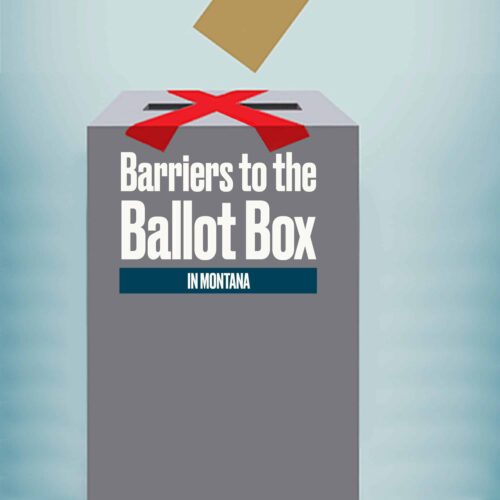Introduction
More than half of Montana’s 726,000 registered voters have already cast a ballot in the Nov. 3 election. The record-breaking number of early votes comes after a monthlong fight between state officials and national Republican leaders over the state’s decision to expand voting by mail during the COVID-19 pandemic.
Montana already had voter-friendly rules in place before the outbreak. Registered voters can request an absentee ballot without an excuse and can choose to have a ballot sent to them in every election. Montana is also one of the states that let people register to vote on Election Day.
Sign up for The Moment newsletter
Our CEO Susan Smith Richardson guides you through conversations and context on race and inequality.
Gov. Steve Bullock, a Democrat, made it even easier to vote by allowing counties to run the election entirely by mail during the pandemic. That meant local election officials could mail ballots to all voters without waiting for individual requests.
The Republican National Committee and the Trump campaign tried to block these changes. In September, they sued Bullock in federal court, accusing the governor of changing the rules to help him get elected (Bullock is running for a U.S. Senate seat in a tight race). They also claimed the new rules would enable voter fraud.
On Sept. 30, U.S. District Court Judge Dana Christensen rejected the plaintiffs’ claims, calling the voter fraud allegations “fiction.”
“There is no record of election fraud in Montana’s recent history, and it is highly unlikely that fraud will occur during the November 3, 2020 general election,” Christensen wrote in her order denying the motion to block the vote-by-mail policy.
In recent years, Republican state lawmakers have also tried — and failed — to restrict voting. They introduced legislation that would have required voters to present a photo ID at the polls and another bill that would have prohibited voters from registering on Election Day. Neither passed.
Yet the push to expand mail-in voting doesn’t help all residents in Montana. The state has seven Native American reservations, where voters have limited access to the postal service, making voting by mail an obstacle. All but 10 of Montana’s 56 counties are holding the election with mail-in ballots only, though voters can deliver their ballots to drop boxes or election offices.
Here are two policies Native Americans voters have successfully challenged in Montana this year:
Mail-only voting disenfranchises Native voters
Native Americans make up about 8% of Montana’s population, one of the largest shares in the nation. Most live on one of seven tribal reservations in the state.
It was hard enough for tribal members to vote before the pandemic hit. Lack of mail service and long distances to the polls are common. For example, the state’s decision to let counties conduct the election by mail meant that Blackfeet tribal members would have to drive up to 80 miles to deliver their ballots in Ponderosa County.
Voting by mail is not a reasonable option for tribal members because houses on the Blackfeet reservation do not receive mail delivery, according to the Native American Rights Fund. Post offices are often located far away, and roads are sometimes impassable during winter months.
Voting by mail “often leaves Native voters without a voice in the political process,” wrote Jacqueline De León, a staff attorney for the Native American Rights Fund.
Earlier this month, the group sued Ponderosa County for opening a satellite voting office where a majority of white residents live, while refusing to staff one closer to the reservation.
Three days after the lawsuit was filed, county officials agreed to open a satellite office and place a ballot drop box closer to the reservation.
Court blocks ballot collection ban
Two years ago, Montana voters approved a measure called the Ballot Interference Prevention Act, which limited how many filled-out ballots someone can deliver to election officials on behalf of voters: six. The law also barred nonprofit groups from collecting those ballots.
The law, known as BIPA, was a huge blow to the state’s tribal voters, who have long relied on civic groups to pick up their ballots and deliver them to be counted.
In March, multiple tribes sued to block the 2018 law, arguing that it was intended to suppress voter turnout among Native Americans who live on reservations and are more likely to deal with unreliable roads, lack of home mail service and similar voting barriers.
In September, a state judge sided with them and permanently blocked the law from taking effect.
Judge Jessica Fehr said ballot collection is particularly important during the pandemic, which has hit Native communities harder than others.
“Without the benefit of assistance with their ballots, the Native American vote has been and will be harmed,” she wrote in her order.
Read more in Money and Democracy
US Polling Places
Arkansas rejects absentee ballots at a high rate, but won’t inform voters
The state’s felony disenfranchisement and voter ID laws disproportionately impact people of color.
US Polling Places
In New Jersey, a switch to vote by mail and partial end to felony disenfranchisement
The state is sending a ballot this year to every registered voter, including those on probation and parole.


Join the conversation
Show Comments